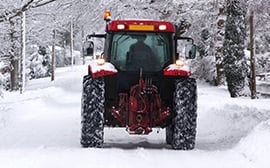Farmers face different challenges throughout the year when it comes to operating and maintaining agricultural equipment, and winter is no exception. Preparation is key to keeping farms moving in harsh conditions and making sure everything is ready to leap into action when spring arrives. To avoid the costly disruption caused by winter weather, we’ve outlined some top tips to help farms get ready for the deep freeze.
Don’t freeze up
When the cold sets in, a farm’s fuel supply can be at risk of forming wax crystals that can clog up your engine or even prevent machinery from starting at all. Adding Anti-Wax, which co-crystallises with the fuel wax crystals to change their shape and make them smaller, allows engine operation at colder temperatures than the original fuel specification.
To improve the cold flow and handling properties of your fuel, Anti-Wax additive is best added to your supply while temperatures are above six degrees Celsius and before signs of waxing start to appear.
Protect your machinery in storage
Ensuring vehicles and machinery are well maintained is essential to running an efficient farm – and this is never more important than when your equipment is in winter storage. Effective lubrication is key to keeping machinery protected when it’s not in use for extended periods of time. Despite this, a study by Shell Lubricants revealed that only 29% of farmers surveyed understand how effective lubrication offers protection against wear and tear which can lead to cost savings.
The reality is, if machinery is left unlubricated during the cold, wet, winter months, metal surfaces can become corroded and the resulting rust can affect the functionality of equipment. This results in costly repairs or replacement of expensive parts and components to get machinery up and running again once winter is over.
Investing in high-performance lubricants can deliver long-term cost of ownership savings by immediately protecting against wear and tear, resulting in extended equipment life, increased uptime between maintenance periods and less spend on spare parts.
Make smart fuel choices
As the new year approaches, there is a real opportunity for the agricultural industry to reassess its traditional reliance on diesel, improve its HSE credentials and make a lasting difference to air quality.
GTL Fuel is a cleaner-burning alternative to diesel proven to immediately lower levels of nitrogen oxide (NOx) and particulate matter (PM) for improved local air quality. It is also free of unwanted components such as sulphur, metals, and aromatics, making it non-toxic and less harmful to the environment and the farming workforce.
In some cases, taking steps to reduce emissions can be costly and disruptive – particularly when upgrades to machinery and storage solutions are required to accommodate the switch. One of the major benefits of GTL Fuel is that it can be used in existing heavy-duty and light-duty diesel engines without the need for engine modifications, new infrastructure or new vehicle investment. The fuel’s winter grade is also especially beneficial when making the switch in the build-up to winter preparation, minimising the risk of waxing and improving cold start properties during lower temperatures.
Having the right fuel, lubricants and additives – and a reliable supply of them – is essential for the smooth operation of farms during the quieter winter season.
Find out more
Contact Certas Energy Team
TAKE CONTROL OF YOUR FLEETS FUEL
Ready to start fuelling your business' success?
Steamline your fleet operations, control costs, and experience the benefits of Certas Energy Fuel Cards. Get in touch to start saving today.




